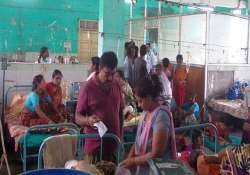Encephalitis: 3 more deaths in West Bengal, toll rises to 102
New Delhi: Japanese Encephalitis claimed three more lives in Siliguri district in India's eastern West Bengal state on Wednesday (August 06), taking the death toll to 102. The deceased were identified as Arjun Singh (27)

New Delhi: Japanese Encephalitis claimed three more lives in Siliguri district in India's eastern West Bengal state on Wednesday (August 06), taking the death toll to 102.
The deceased were identified as Arjun Singh (27) from North Dinajpur district, Joya Saibo (22) and Roma Barman (13) from Jalpaiguri district. Joya's father Suren Saibo said he was informed late that her daughter died due to brain fever.
Outbreaks of Acute Encephalitis Syndrome and Japanese Encephalitis are common every year in India, especially during the monsoon season, and claim hundreds of lives.
But this year, major outbreaks - usually most prevalent in the northern states of Uttar Pradesh and Bihar - have spread to regions such as West Bengal and Assam further east and north - killing 568 people.
In West Bengal a senior health official said authorities were taking emergency steps to contain the outbreak. Recently, two chief medical health officers and NBMCH superintendent were suspended by the provincial government for allegedly failing to control the outbreak of the disease.
Families of patients claimed the government was not appointing better officials for curing the diagnosed victims and instead was only suspending doctors.
Almost 570 people in India have died after contracting encephalitis, commonly known as brain fever, health authorities said, warning the death toll may rise with more people still at risk.
The health department has set up clinics across affected areas and is trying to prevent breeding of mosquitoes by fogging, especially around pig farms, where there is a high risk of contracting the virus.
Encephalitis is an inflammation of the brain, caused by any one of a number of viruses, says the World Health Organisation. Symptoms include high fever, vomiting and, in severe cases, seizures, paralysis and coma. Infants and elderly people are particularly vulnerable.
Outbreaks of the virus tend to occur in poor, flood-hit areas, where monsoons have left pools of stagnant water, allowing mosquitoes to breed and infect villagers.
Floods also lead to the contamination of clean water sources such as wells, leaving many people with no option but to use the same dirty water for both drinking and sanitation.
There were 1,273 deaths due to encephalitis in 2013 compared to 440 deaths from malaria and 193 from dengue, according to government statistics.
The deceased were identified as Arjun Singh (27) from North Dinajpur district, Joya Saibo (22) and Roma Barman (13) from Jalpaiguri district. Joya's father Suren Saibo said he was informed late that her daughter died due to brain fever.
Outbreaks of Acute Encephalitis Syndrome and Japanese Encephalitis are common every year in India, especially during the monsoon season, and claim hundreds of lives.
But this year, major outbreaks - usually most prevalent in the northern states of Uttar Pradesh and Bihar - have spread to regions such as West Bengal and Assam further east and north - killing 568 people.
In West Bengal a senior health official said authorities were taking emergency steps to contain the outbreak. Recently, two chief medical health officers and NBMCH superintendent were suspended by the provincial government for allegedly failing to control the outbreak of the disease.
Families of patients claimed the government was not appointing better officials for curing the diagnosed victims and instead was only suspending doctors.
Almost 570 people in India have died after contracting encephalitis, commonly known as brain fever, health authorities said, warning the death toll may rise with more people still at risk.
The health department has set up clinics across affected areas and is trying to prevent breeding of mosquitoes by fogging, especially around pig farms, where there is a high risk of contracting the virus.
Encephalitis is an inflammation of the brain, caused by any one of a number of viruses, says the World Health Organisation. Symptoms include high fever, vomiting and, in severe cases, seizures, paralysis and coma. Infants and elderly people are particularly vulnerable.
Outbreaks of the virus tend to occur in poor, flood-hit areas, where monsoons have left pools of stagnant water, allowing mosquitoes to breed and infect villagers.
Floods also lead to the contamination of clean water sources such as wells, leaving many people with no option but to use the same dirty water for both drinking and sanitation.
There were 1,273 deaths due to encephalitis in 2013 compared to 440 deaths from malaria and 193 from dengue, according to government statistics.